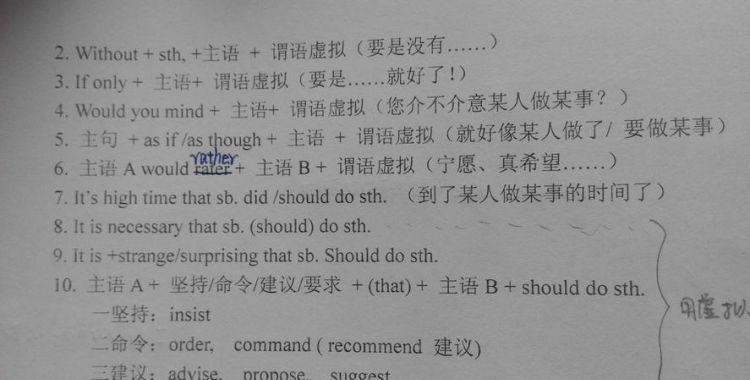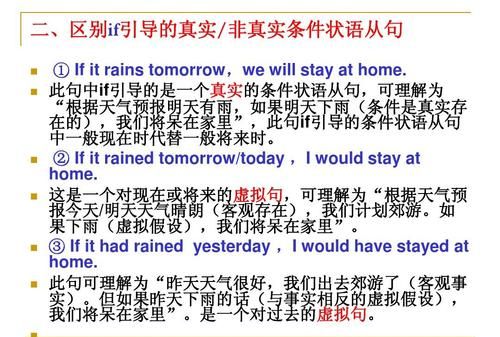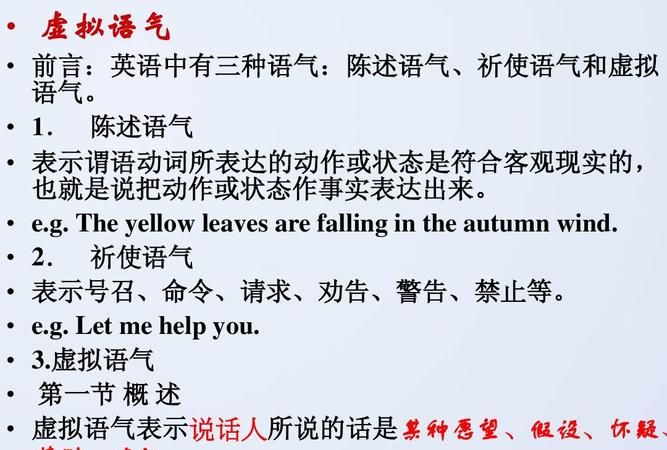本文目录
虚拟语气 if he had listened
1. 答案正确,楼主理解有误.
if引导的条件状语从句的虚拟语气存在着一种所谓的“混合”的说法,即从句和主句是针对发生在不同时间的动作分别进行各自虚拟.
此题从句就是针对过去动作的虚拟,所以用过去完成时即“had+过去分词”,但是主句缺少对现在动作进行虚拟,所以用“would / should / could / might + 动词原形”即可.
2. if only引导虚拟条件句,如果针对过去虚拟,从句就用过去完成时;如果针对现在虚拟,则用一般过去时.而主句同样是对现在进行虚拟,所以也用“would / should / could / might + 动词原形”即可.
It would be very nice if only it were possible.
如果它(现在)是有可能的,(现在)那该有多好啊!
3. Let's say和you could go there都有虚拟的暗示.
“Let's say”直译为“让我们说”,其实就是“让我们假设”之意,所以后面用could而不用can,而最后面也用“would you feel”了.
最好的理解是,把Let's say换成if就可以了,即原句可以换写成:
If you could go there again, how would you feel?
4. as if/though引导的方式状语从句的虚拟语气,跟主句的时态并无关系,而是把主句动作和从句动作发生的时间进行对比.
1)从句动作发生在主句动作之前,则从句用过去完成时;
2)从句动作与主句动作同时发生,则从句用一般过去时或过去进行时;
3)从句动作发生在主句动作之后,则从句用过去将来时.
该题know everything是发生在talk之前,所以从句直接用过去完成时.
再如:He always talks as though I were his child.(同时发生)
He always talks as though he would never be able to talk in the future.(从句动作发生在主句动作之后)
5. wish引导的宾语从句的虚拟语气和主句时态也没有关系,而是直接看从句动作发生的时间,如果是过去发生,则用过去完成时;从句动作发生在现在,则用一般过去时;从句动作发生在将来,则用过去将来时.
从题意来看,应该是“他希望他早已经看过这场足球比赛而不是在电影里看过(?)”,所以是指“(过去的时候)早就看过”.从句动作发生在过去,所以从句时态用过去完成时.

英语虚拟语气句子摘抄
1.Only if I could had the wisdom like you!
2.That German girl speaks Greek so fluent as if she were a native Greek.
3.Only if I hadn't told him our secret!
4.How I wish I hadn't spent so much money!
5.I wish I could go to the moon one day!
6.The teacher is so angry as if she were going to kill me.
希望能帮上你的忙!

英语虚拟语气总结简洁明了
呵呵 希望对你有所帮助 祝楼主进步哈
1.虚拟语气
① 虚拟条件句 (if)
A:条件与现在或将来的事实不符合:if +过去时, 主+would +V原
B:条件与过去事实不符合:if +过去完成时,主+ would have done
If we had enough money, we would buy a computer.
If he knew the facts, he could tell us what to do.
If you took more exercise, you might feel healthier.
If I were to ask, would you help me?
If I had left sooner, I’d have been on time.
If I had gotten up earlier this morning, I might not have been late.
If he had received the present, he should have thanked her.
②虚拟语气在从句中的使用 : 主+(should)+V原
主+决定、打算、建议、要求、坚持+(should)+V原
urge/demand/command/order/ask/require/request/insist/intend/prefer/advise/
recommend/propose/ suggest
他们的名词之后+句子,这句子也要用同样的结构
requirement/ advice/proposal/demand/ decision/ request/ suggestion
eg: Her suggestion is that they (should) carry on their conversation in French.
it’s vital/ important/ essential/ appropriate/ strange/ advisable(明智的)/ desirable/necessary/natural… that +(should)+V原
It’s vital that we be present.
It is important that this mission not fail.
in case, lest, for fear that +(should)+V原
I put a coat over him in case that he should catch a cold.
It is a pity /a shame/no wonder that+should +V原
If only 引导的感叹句(要是。。。该多好啊)
If only I knew the answer!
If only I had seen the film yesterday!
would rather + 从句 动词用过去式或过去完成时
I would rather you told me the truth.
I would rather you had gone there last Sunday.
as if ( as though) 看起来 常用虚拟形式,即表示与现在事实相反,用过去式;与过去事实相反用过去完成式 (had done).
He speaks/ spoke as if he had known about it
He treats /treated the boy as if he were his own son.
even if ( even though)即使
Even if he were here, he could not solve the problem.
2.Wish 的用法:
Ved(现在,将来) had done(过去) would V原(有可能实现但可能性较低的愿望)
I wish we had more money.
I wish that I had never met him.
I wish you wouldn’t smoke any more
it’s (high/about) time that + V过:
It’s high time that we went to bed.
would rather(sooner)+Ved(现在、将来)/ had done(过去)
I would rather you told me the truth.
I would rather he hadn’t told me about it.
as if/though+ Ved(现在、将来)/ had done(过去)
He acts as if he knew you.
You sat there as if nothing had happened.
时态:
一般过去时:过去某一时间发生的事
主+be/V 的过去式:He was young at the time.
Betty called me this morning.
现在完成时:对现在来说已经发生的事,没有过去时间: 主+have/has +V 过去分词
The rain has stopped.
完成进行时:从过去某时起一直持续的动作,也许刚停止,也许还在进行。主+have/has been doing
I have been waiting for you for an hour.
She’s been working all morning.
一般将来时:还未发生的事。主+will do
The concert will start in a minute.
将来完成时:在将来一个时间前已经完成的动作: 主+will have done
Call us after 8o’clock. We will have finished dinner by then.
过去完成时:在过去一个时间前已经完成的动作:
主+had done
When I got to the station the train had left
一般现在时:经常性,反复性的动作,现在的状态
主+be 或V(主语为单三V+s/es)
My father is retired now. He gets up early.
现在进行时:现在正在发生的动作 主+be +Ving
Turn off the radio. Jane is studying.
被动语态:
常用时态的被动语态
过去时 主+was/were+done
A new library was completed in June.
将来时 主+will be+done
A new library will be completed next June.
现在完成时 主+have/has been+done
A new library has been completed.
一般现在时 主+am/is/are+done
Housework is always done by housewives.
现在进行时 主+am/is/are being+done
A new library is being built.
情态动词的被动语态
Can/must/should/may/have to be done
能够、必须、应该、也许会、必须被做
Should/must/may have been done本应该被做而没有、一定已经被、也许已经被
His request may be refused.
I can’t find my wallet, it must/may be stolen.
Your homework should have been finished last week.
情态动词的用法
can/must/may/should/have to do/used to do sth.
能够、必须、也许/可以、应该、不得不、曾经做
Must/can’t/may have done 推测的用法
一定已经做了、不可能已经做了、也许已经做了
He must/can’t/may have arrived already.
should/shouldn’t/needn’t have done
本应该做而没做、本不该做而做了、本不需要做而做了。
You are right, I should have thought of that.
四 情态动词+ have done
could have done 本来可以- - -
might have done 本来可能 - - -
should / ought to have done 本来应该做 - - -
shouldn’t / ought not to have done 本不该做 - -
needn’t have done 本不必做 -
would have done 本来会去做----
倒装句
否定词在居首,部分倒装,如never, little, barely, hardly, scarcely, seldom, not until, not only
at no time, under no circumstance, by no means, in no case (决不), in vain
Little did we know of this country’s abundance in natural resources.
Under no circumstances should a communist place his personal interest first.
Not only did he speak correctly, but he spoke more easily.
Hardly(scarcely)…when与No sooner…than 的句型
Hardly+ had sb done + when sb V过去时
Hardly had I got home when the telephone rang.
Only 放句首+adj/adv/介词短语
Only in this way can our honor be saved
步骤:首先快速浏览句子,先看英语不看汉语,从而判断划线处所填句子的时态,语态。
判断除了时态,语态外考察的语法(如虚拟语气)
判断考的固定搭配(不定式短语、分词短 语 ),选用合适的动词连接。

英语虚拟语气的词有哪些
条件中的虚拟语气的举例
(1) 将来时的条件句中的虚拟语气。如:
If he should go to Qing Hua University, he would make full use of his time. 如果他要上清华大学的话,他就会充分利用他的时间了。
If he were to come here, he would tell us about it. 如果他要来的话,他会通知我们一声。
(2) 现在时的条件句中的虚拟语气。如:
If he were free, he would help us. 要是他有空的话,它会帮助我们的。
If he studied at this school, he would know you well. 如果他在这所学校学习的话,它会对你很熟悉。
(3) 过去时的条件句中的虚拟语气。如:
If I had seen the film, I would have told you about it. 我如果看过这场电影,我会把电影内容告诉你了。
If I had got there earlier, I would have met Mr. Li. 如果我早点到那儿,我就会会到了李先生。
3. 运用条件句中的虚拟语气时,须注意的几个问题
(1) 当从句的主语为第三人称单数时,谓语动词若是系动词be时,可用was代替were。但在倒装虚拟结构及if I were you, as it were中,只能用were。如:
Were I ten years younger, I would study abroad. 要是我还年轻十岁的话,我会去国外学习。
If I were you, I would try my best to grasp the chance. 要是我是你的话,我要尽力抓住这次机会。
(2) 有时,虚拟条件句中,主、从句的动作若不是同时发生时,须区别对待。
①从句的动作与过去事实相反,而主句的动作与现在或现在正在发生的事实不符。如:
If I had worked hard at school, I would be an engineer, too. 如果我在学校学习刻苦的话,我现在也会使工程师了
If they had informed us, we would not come here now. 如果他们通知过我们的话,我们现在就不会来这里了。
②从句的动作与现在事实相反,而主句的动作与过去事实不符。如:
If he were free today, we would have sent him to Beijing. 如果他今天有空的话,我们会已经派他去北京了。
If he knew her, he would have greeted her. 要是他认识她的话,他肯定会去问候她了。
③从句的动作与过去发生的情况相反,而主句的动作与现在正在发生的情况相反。如:
If it had not been raining too much, the crops would be growing much better. 如果天不下太多的雨的话,庄家会长得更好。
If he had been working hard, he would be working in the office now. 要是他工作一直努力的话,他现在已进了办公室了。
(3) 当虚拟条件句的谓语动词含有were, should, had时,if可省略,而将were, should, had等词置于句首。如:
Should he agree to go there, we would send him there. 要是他答应去的话,我们就派他去。
Were she here, she would agree with us. 如果她在这儿的话,她会同意我们的。
Had he learnt about computers, we would have hired him to work here. 如果她懂一些电脑知识的话,我们会已经聘用他来这里工作了。
(4) 有时,句子没有直接给出假设情况的条件,而须通过上下文或其他方式来判断。如:
I would have come to see you, but I was too busy. 我本该来看你了,然而我太忙了。
But for his help, we would be working now. 要不是他的帮助,我们还会在工作呢。
Without your instruction, I would not have made such great progress. 要是没有你的指导,我不会取得如此大的进步。
(5) 有时,虚拟条件句中,主、从句可以省略其中的一个,来表示说话人的一种强烈的感情。
①省略从句
He would have finished it. 他本该完成了。
You could have passed this exam. 你应该会通过这次考试了。
②省略主句
If I were at home now. 要是我现在在家里该多好啊。
If only I had got it. 要是我得到它了该多好啊。

以上就是关于英语100个虚拟语气句子 ,英语虚拟语气的语句有哪些怎么用的全部内容,以及英语100个虚拟语气句子 的相关内容,希望能够帮到您。

